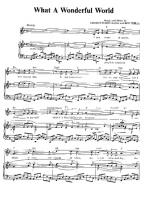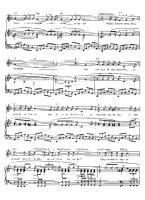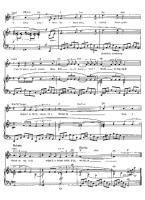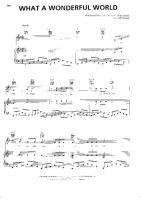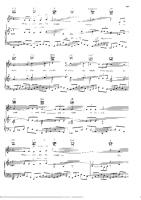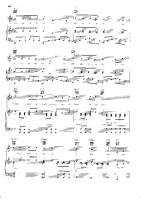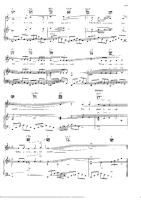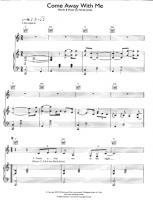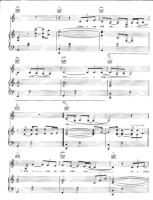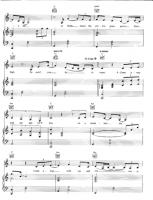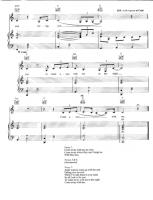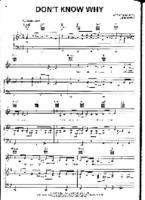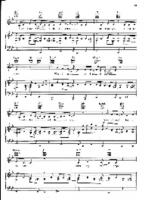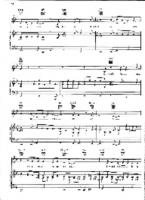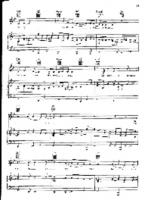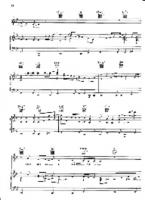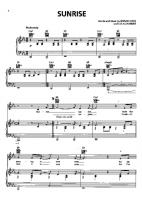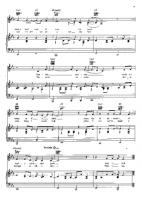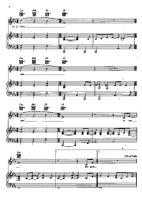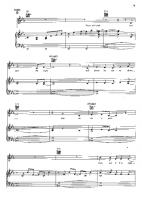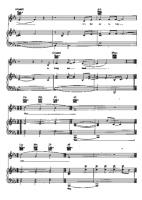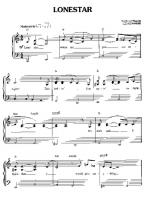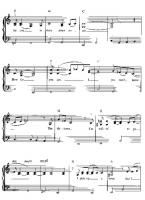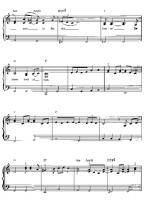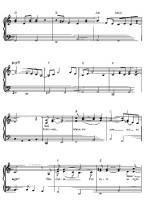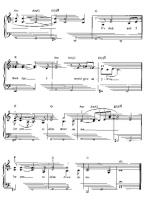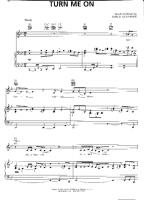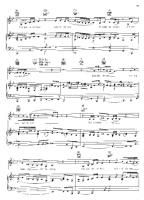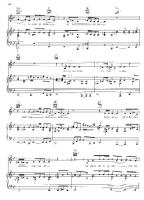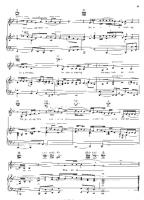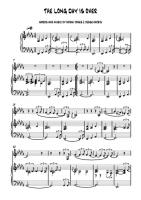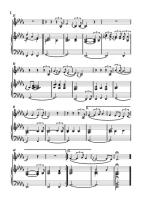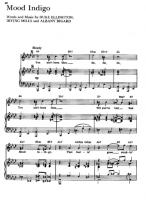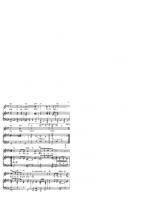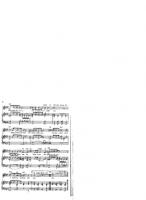Piano Sheet Music
 "Music is the vernacular of the human soul." Geoffrey Latham
"Music is the vernacular of the human soul." Geoffrey Latham
Rachmaninoff
 Sergei Vasilievich Rachmaninoff (1 April 1873 - 28 March 1943) was a Russian composer, pianist, and conductor. He was one of the finest pianists of his day and, as a composer, the last great representative of Russian late Romanticism in classical music. Early influences of Tchaikovsky, Rimsky-Korsakov and other Russian composers gave way to a thoroughly personal idiom which included a pronounced lyricism, expressive breadth, structural ingenuity and a tonal palette of rich, distinctive orchestral colors.
Sergei Vasilievich Rachmaninoff (1 April 1873 - 28 March 1943) was a Russian composer, pianist, and conductor. He was one of the finest pianists of his day and, as a composer, the last great representative of Russian late Romanticism in classical music. Early influences of Tchaikovsky, Rimsky-Korsakov and other Russian composers gave way to a thoroughly personal idiom which included a pronounced lyricism, expressive breadth, structural ingenuity and a tonal palette of rich, distinctive orchestral colors.Understandably, the piano figures prominently in Rachmaninoff's compositional output, either as a solo instrument or as part of an ensemble. He made it a point, however, to use his own skills as a performer to explore fully the expressive possibilities of the instrument. Even in his earliest works, he revealed a sure grasp of idiomatic piano writing and a striking gift for melody. In some of his early orchestral pieces he showed the first signs of a talent for tone painting, which he would perfect in The Isle of the Dead, and he began to show a similar penchant for vocal writing in two early sets of songs, Opp. 4 and 8. Rachmaninoff's masterpiece, however, is his choral symphony The Bells, in which all of his talents are fused and unified.
Rachmaninoff sometimes felt threatened by the success of modernists such as Scriabin and Prokofiev and wondered whether to cease composing even before he left Russia. His musical philosophy was rooted in the Russian spiritual tradition, where the role of the artist was to create beauty and to speak the truth from the depths of his heart. In his last major interview, in 1941, he admitted his music, like Russian music, was a product of his temperament. He said, on another occasion, "The new kind of music seems to create not from the heart but from the head. Its composers think rather than feel. They have not the capacity to make their works exalt—they meditate, protest, analyze, reason, calculate and brood, but they do not exalt."
Dvorak
 Antonín Leopold Dvořák (September 8, 1841 – May 1, 1904) was a Czech composer of Romantic music, who employed the idioms and melodies of the folk music of his native Bohemia and Moravia. His works include operas, symphonic, choral and chamber music. His best-known works are his New World Symphony (particularly the slow movement), as well as his Slavonic Dances, American String Quartet, and Cello Concerto in B minor.
Antonín Leopold Dvořák (September 8, 1841 – May 1, 1904) was a Czech composer of Romantic music, who employed the idioms and melodies of the folk music of his native Bohemia and Moravia. His works include operas, symphonic, choral and chamber music. His best-known works are his New World Symphony (particularly the slow movement), as well as his Slavonic Dances, American String Quartet, and Cello Concerto in B minor.Dvořák wrote in a variety of forms: his nine symphonies generally stick to classical models that Beethoven would have recognised, but he also worked in the newly developed symphonic poem form and the influence of Richard Wagner is apparent in some works. Many of his works also show the influence of Czech folk music, both in terms of rhythms and melodic shapes; perhaps the best known examples are the two sets of Slavonic Dances. Dvořák also wrote operas (the best known of which is Rusalka); serenades for string orchestra and wind ensemble; chamber music (including a number of string quartets, and quintets); songs; choral music; and piano music.
Mussorgsky
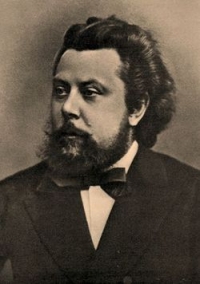 Modest Petrovich Mussorgsky (March 21, 1839 – March 28, 1881), one of the Russian composers known as the Five, was an innovator of Russian music. He strove to achieve a uniquely Russian musical identity, often in deliberate defiance of the established conventions of Western music.
Modest Petrovich Mussorgsky (March 21, 1839 – March 28, 1881), one of the Russian composers known as the Five, was an innovator of Russian music. He strove to achieve a uniquely Russian musical identity, often in deliberate defiance of the established conventions of Western music.Like his literary contemporary Fyodor Dostoyevsky, Mussorgsky depicts in his music "the insulted and the injured" with all their passion and pain. He raises these characters to tragic heights until the grotesque and majestic coexist. Mussorgsky could accomplish this not simply out of compassion or guilt towards them, but because in his works he almost becomes them. Mussorgsky's music is vivid, confused, feverish and ultimately hypnotizing —again, like Dostoyevsky at his best.
Many of his major works were inspired by Russian history, Russian folklore, and other nationalist themes, including the opera Boris Godunov, the orchestral tone poem Night on Bald Mountain, and the piano suite Pictures at an Exhibition. However, while Mussorgsky's music can be vivid and nationalistic, it does not glorify the powerful and is at times (such as in The Field-Marshal) antimilitaristic. For this reason, it was perceived as being directed against the state and its composer "under suspicion." He, like the others in The Russian Five, were considered dangerous extremists by the emperor and his court. This may have been the reason Tsar Alexander III personally crossed off Boris Godounov from the list of proposed pieces for the imperial opera in 1888.
For many years Mussorgsky's works were mainly known in versions revised or completed by other composers. Many of his most important compositions have recently come into their own in their original forms, and some of the original scores are now also available.
Gluck
 Christoph Willibald Ritter von Gluck (born 2 July 1714 Erasbach, Upper Palatinate; died 15 November 1787 in Vienna) was a composer of the 18th century, most noted for his operatic works. After many years at the Habsburg court at Vienna, Gluck brought about the practical reform of opera's dramaturgical practices that many intellectuals had been campaigning for over the years. With a series of radical new works in the 1760s, among them Orfeo ed Euridice and Alceste, he broke the stranglehold that Metastasian opera seria had enjoyed for much of the century.
Christoph Willibald Ritter von Gluck (born 2 July 1714 Erasbach, Upper Palatinate; died 15 November 1787 in Vienna) was a composer of the 18th century, most noted for his operatic works. After many years at the Habsburg court at Vienna, Gluck brought about the practical reform of opera's dramaturgical practices that many intellectuals had been campaigning for over the years. With a series of radical new works in the 1760s, among them Orfeo ed Euridice and Alceste, he broke the stranglehold that Metastasian opera seria had enjoyed for much of the century.The strong influence of French opera in these works encouraged Gluck to move to Paris, which he did in November 1773. Fusing the traditions of Italian opera and the French national genre into a new synthesis, Gluck wrote eight operas for the Parisian stages. One of the last of these, Iphigénie en Tauride, was a great success and is generally acknowledged to be his finest work. Though extremely popular and widely credited with bringing about a revolution in French opera, Gluck's mastery of the Parisian operatic scene was never absolute, and after the poor reception of his Echo et Narcisse, he left Paris in disgust and returned to Vienna to live out the remainder of his life.
Diana Krall
 Diana Jean Krall, (born November 16, 1964) is a Canadian jazz pianist and singer.
Diana Jean Krall, (born November 16, 1964) is a Canadian jazz pianist and singer.Krall was born into a musical family in Nanaimo, British Columbia, Canada. She began learning the piano at the age of four. In high school, she started playing in a small jazz group. When she was 15 she started playing regularly in several Nanaimo restaurants.
At age seventeen she won a scholarship from the Vancouver International Jazz Festival to study at the Berklee College of Music in Boston, and completed three terms.
In Nanaimo her playing attracted the attention of famed bass player Ray Brown (ex-husband of the late Ella Fitzgerald, long-time member of the Oscar Peterson Trio and Grammy-winning composer) and drummer Jeff Hamilton. After hearing her play, Brown and Hamilton persuaded Krall to move to Los Angeles, and study with pianist Jimmy Rowles, with whom she began to sing. This also brought her into contact with influential teachers and producers. In 1990, Krall relocated to New York.
Frank Sinatra
 Francis Albert "Frank" Sinatra (December 12, 1915 â May 14, 1998) was an American singer and actor.
Francis Albert "Frank" Sinatra (December 12, 1915 â May 14, 1998) was an American singer and actor.Beginning his musical career in the swing era with Harry James and Tommy Dorsey, Sinatra became a solo artist with great success in the early to mid-1940s, being the idol of the "bobby soxers". His professional career had stalled by the 1950s, but it was reborn in 1954 after he won the Academy Award for Best Supporting Actor.
He signed with Capitol Records and released several critically lauded albums (such as In the Wee Small Hours, Songs for Swingin' Lovers, Come Fly with Me, Only the Lonely and Nice 'n' Easy). Sinatra left Capitol to found his own record label, Reprise Records (finding success with albums such as Ring-A-Ding-Ding, Sinatra at the Sands and Francis Albert Sinatra & Antonio Carlos Jobim), toured internationally, and fraternized with the Rat Pack and President John F. Kennedy in the early 1960s. Sinatra turned 50 in 1965, recorded the retrospective September of My Years, starred in the Emmy-winning television special Frank Sinatra: A Man and His Music, and scored hits with "Strangers in the Night" and "My Way".
Sinatra attempted to weather the changing tastes in popular music, but with dwindling album sales and after appearing in several poorly received films, he retired in 1971. Coming out of retirement in 1973, he recorded several albums, scoring a hit with "(Theme From) New York, New York" in 1980, and toured both within the United States and internationally until a few years before his death in 1998.
Sinatra also forged a career as a dramatic actor, winning the Academy Award for Best Supporting Actor for his performance in From Here to Eternity, and he was nominated for the Academy Award for Best Actor for The Man with the Golden Arm. His also starred in such musicals as High Society, Pal Joey, Guys and Dolls and On the Town. Sinatra was honored with the Kennedy Center Honors in 1983 and awarded the Presidential Medal of Freedom by Ronald Reagan in 1985 and the Congressional Gold Medal in 1997. Sinatra was also the recipient of eleven Grammy Awards, including the Grammy Trustees Award, Grammy Legend Award and the Grammy Lifetime Achievement Award.
Louis Armstrong
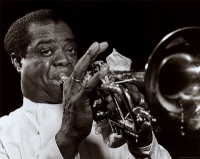 Louis Armstrong (4 August 1901 – July 6, 1971), nicknamed Satchmo or Sachimo and Pops, was an American jazz trumpeter and singer.
Louis Armstrong (4 August 1901 – July 6, 1971), nicknamed Satchmo or Sachimo and Pops, was an American jazz trumpeter and singer.Coming to prominence in the 20s as an innovative cornet and trumpet virtuoso, Armstrong was a foundational influence on jazz, shifting the music's focus from collective improvisation to solo performers. With his distinctive gravelly voice, Armstrong was an influential singer, demonstrating great dexterity as an improviser, bending the lyrics and melody of a song for expressive purposes. He was also greatly skilled at scat singing, or wordless vocalizing.
Renowned for his charismatic stage presence, Armstrong's influence extended well beyond jazz, and by the end of his career in the '60s, he was widely regarded as a profound influence on popular music in general: critic Steve Leggett describes Armstrong as "perhaps the most important American musician of the 20th century."
Norah Jones
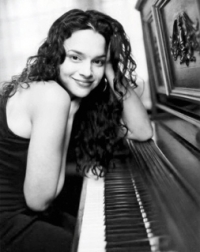 Norah Jones (born Geethali Norah Jones Shankar on March 30, 1979) is an American singer-songwriter, pianist, keyboardist, guitarist, and occasional actress of Anglo-American and Bengali descent. She is the daughter of famed sitar virtuoso Ravi Shankar and half-sister of sitarist Anoushka Shankar.
Norah Jones (born Geethali Norah Jones Shankar on March 30, 1979) is an American singer-songwriter, pianist, keyboardist, guitarist, and occasional actress of Anglo-American and Bengali descent. She is the daughter of famed sitar virtuoso Ravi Shankar and half-sister of sitarist Anoushka Shankar.Jones' career was launched with her 2002 debut album Come Away with Me, an adult contemporary pop/vocal jazz album with a sensual, plaintive soul/folk/country tinge, that sold over twenty million copies worldwide and received five Grammy Awards, with Jones winning "Best New Artist". Her second album, Feels like Home, was released in 2004, clocking more than a million sales in the first week of U.S. release. In 2007, she released her third album, Not Too Late, which debuted at number one on the world charts. She has become one of the most successful recording artists of the decade, racking up sales of more than 16 million records in the US and 39 million records worldwide.
Ray Charles
 Raymond Charles Robinson (September 23, 1930 â June 10, 2004), known by his stage name Ray Charles, was an American pianist and singer who shaped the sound of rhythm and blues. He brought a soulful sound to country music, pop standards, and a rendition of "America the Beautiful" that Ed Bradley of 60 Minutes called the "definitive version of the song, an American anthem â a classic, just as the man who sung it." Frank Sinatra called him "the only true genius in the business" and in 2004, Rolling Stone Magazine ranked Charles #10 on their list of the 100 Greatest Artists of All Time.
Raymond Charles Robinson (September 23, 1930 â June 10, 2004), known by his stage name Ray Charles, was an American pianist and singer who shaped the sound of rhythm and blues. He brought a soulful sound to country music, pop standards, and a rendition of "America the Beautiful" that Ed Bradley of 60 Minutes called the "definitive version of the song, an American anthem â a classic, just as the man who sung it." Frank Sinatra called him "the only true genius in the business" and in 2004, Rolling Stone Magazine ranked Charles #10 on their list of the 100 Greatest Artists of All Time.During the late 1960s and into the 1970s, Charles' releases were hit-or-miss, with some big hits and critically acclaimed work. His version of "Georgia On My Mind" was proclaimed the state song of Georgia on April 24, 1979, with Charles performing it on the floor of the state legislature.
He died on June 10, 2004 of hepatocellular carcinoma (liver cancer) at his home in Beverly Hills, California, surrounded by family and friends. His body was interred in the Inglewood Park Cemetery in Inglewood, California. His final album, Genius Loves Company, released two months after his death, consists of duets with various admirers and contemporaries: B.B. King, Van Morrison, Willie Nelson, James Taylor, Gladys Knight, Michael McDonald, Natalie Cole, Elton John, Bonnie Raitt, Diana Krall, Norah Jones, and Johnny Mathis.
Dean Martin
 Dean Martin (born Dino Paul Crocetti; June 7, 1917 – December 25, 1995) was an American singer, film actor, television personality, and comedian. He was one of the most well known musical artists of the 1950s and 1960s. Martin's hit singles included the songs "Memories Are Made Of This", "That's Amore", "Everybody Loves Somebody", "Mambo Italiano", "Sway", "Volare" and "Ain't That A Kick In The Head?". One of the organizers of The Rat Pack, he was a major star in four areas of show business: concert stage, recordings, motion pictures, and television.
Dean Martin (born Dino Paul Crocetti; June 7, 1917 – December 25, 1995) was an American singer, film actor, television personality, and comedian. He was one of the most well known musical artists of the 1950s and 1960s. Martin's hit singles included the songs "Memories Are Made Of This", "That's Amore", "Everybody Loves Somebody", "Mambo Italiano", "Sway", "Volare" and "Ain't That A Kick In The Head?". One of the organizers of The Rat Pack, he was a major star in four areas of show business: concert stage, recordings, motion pictures, and television.
Jamie Cullum
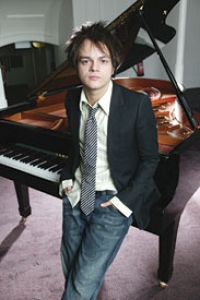 Jamie Cullum (born 20 August 1979) is an English pop and jazz-pop singer, songwriter, pianist, guitarist, and drummer.
Jamie Cullum (born 20 August 1979) is an English pop and jazz-pop singer, songwriter, pianist, guitarist, and drummer.Cullum was born at Romford Hospital in Essex, and educated at the independent fee-paying Grittleton House School and the sixth form at Sheldon School. Both are near Chippenham in Wiltshire. His mother, Yvonne, is a secretary of Anglo-Burmese origin, whose family settled in Wales after Burma's independence; his father, John Cullum, worked in finance. His paternal grandfather was a British Army officer, while his paternal grandmother was a Jewish refugee from Prussia who sang in Berlin nightclubs; Cullum has said that he sees her as his "cultural icon". He was brought up in Hullavington, Wiltshire but currently lives in North West London.
Dave Brubeck
 David Warren Brubeck (born December 6, 1920 in Concord, California), better known as Dave Brubeck, is an American jazz pianist. Regarded as a genius in his field, he has written a number of jazz standards, including "In Your Own Sweet Way" and "The Duke". Brubeck's style ranges from refined to bombastic, reflecting his mother's attempts at classical training and his improvisational skills. Much of his music employs unusual time signatures.
David Warren Brubeck (born December 6, 1920 in Concord, California), better known as Dave Brubeck, is an American jazz pianist. Regarded as a genius in his field, he has written a number of jazz standards, including "In Your Own Sweet Way" and "The Duke". Brubeck's style ranges from refined to bombastic, reflecting his mother's attempts at classical training and his improvisational skills. Much of his music employs unusual time signatures.His long-time musical partner, alto saxophonist Paul Desmond, wrote the Dave Brubeck Quartet's most famous piece, "Take Five", which is in 5/4 time and has endured as a jazz classic. Brubeck experimented with time signatures through much of his career, recording "Pick Up Sticks" in 6/4, "Unsquare Dance" in 7/4, and "Blue Rondo à la Turk" in 9/8. He also provided music for the TV animated miniseries "This Is America, Charlie Brown".
Adele
 Adele Laurie Blue Adkins (born 5 May 1988 in Enfield, North London), She is the first recipient of the Brit Awards Critics' Choice, which was given to artists who, at the time, had yet to release an album. She debuted at number one with her Mercury Prize nominated debut album 19 in the UK album chart and has since then been certified platinum with sales over 500,000 copies.
Adele Laurie Blue Adkins (born 5 May 1988 in Enfield, North London), She is the first recipient of the Brit Awards Critics' Choice, which was given to artists who, at the time, had yet to release an album. She debuted at number one with her Mercury Prize nominated debut album 19 in the UK album chart and has since then been certified platinum with sales over 500,000 copies.
Etta James
 Etta James (born Jamesetta Hawkins on January 25, 1938) is an American blues, soul, R&B, rock & roll and jazz singer and songwriter. James is the winner of four Grammys, seventeen Blues Music Awards, and was inducted into the Rock & Roll Hall of Fame in 1993, the Blues Hall of Fame in 2001, and the Grammy Hall of Fame both in 1999 and 2008. In the 1950s and 60s, she had her biggest success as a blues and R&B singer. She is best known for her 1961 ballad "At Last", which has been classified as a "timeless classic" and has been featured in many movies, television commercials, and web streaming services since its release.
Etta James (born Jamesetta Hawkins on January 25, 1938) is an American blues, soul, R&B, rock & roll and jazz singer and songwriter. James is the winner of four Grammys, seventeen Blues Music Awards, and was inducted into the Rock & Roll Hall of Fame in 1993, the Blues Hall of Fame in 2001, and the Grammy Hall of Fame both in 1999 and 2008. In the 1950s and 60s, she had her biggest success as a blues and R&B singer. She is best known for her 1961 ballad "At Last", which has been classified as a "timeless classic" and has been featured in many movies, television commercials, and web streaming services since its release.
Duke Ellington
 Edward Kennedy "Duke" Ellington (April 29, 1899 â May 24, 1974) was an American composer, pianist, and bandleader.
Edward Kennedy "Duke" Ellington (April 29, 1899 â May 24, 1974) was an American composer, pianist, and bandleader.Recognized during his life as one of the most influential figures in jazz, if not in all American music, Ellington's reputation has increased since his death, including a special award citation from the Pulitzer Prize Board.
Ellington called his style and sound "American Music" rather than jazz, and liked to describe those who impressed him as "beyond category", including many of the musicians who served with his orchestra, some of whom were themselves considered among the giants of jazz and remained with Ellington's orchestra for decades. While many were noteworthy in their own right, it was Ellington that melded them into one of the most well-known orchestral units in the history of jazz. He often composed specifically for the style and skills of these individuals, such as "Jeep's Blues" for Johnny Hodges, "Concerto for Cootie" ("Do Nothing Till You Hear from Me") for Cootie Williams and "The Mooche" for Tricky Sam Nanton. He also recorded songs written by his bandsmen, such as Juan Tizol's "Caravan" and "Perdido" which brought the "Spanish Tinge" to big-band jazz. After 1941, he frequently collaborated with composer-arranger Billy Strayhorn, who he called his alter-ego.
One of the twentieth century's best-known African-American celebrities, Ellington recorded for many American record companies, and appeared in several films. Ellington and his orchestra toured the United States and Europe regularly before and after World War II. Ellington led his band from 1923 until his death in 1974. His son Mercer Ellington took over the band until his death from cancer in 1996. Paul Ellington, Mercer's youngest son, took over the Orchestra from there and after his mother's passing took over the Estate of Duke and Mercer Ellington.
Eva Cassidy
 Eva Marie Cassidy (February 2, 1963 – November 2, 1996) was an American vocalist known for her interpretations of jazz, blues, folk, gospel, country and pop classics. She released her first album The Other Side, a set of duets with go-go musician Chuck Brown in 1992 followed by a live solo album, Live at Blues Alley in 1996. Cassidy was virtually unknown outside her native Washington, DC when she died of melanoma in 1996.
Eva Marie Cassidy (February 2, 1963 – November 2, 1996) was an American vocalist known for her interpretations of jazz, blues, folk, gospel, country and pop classics. She released her first album The Other Side, a set of duets with go-go musician Chuck Brown in 1992 followed by a live solo album, Live at Blues Alley in 1996. Cassidy was virtually unknown outside her native Washington, DC when she died of melanoma in 1996.Four years later, Cassidy's music was brought to the attention of UK audiences when her versions of "Over the Rainbow" and "Fields of Gold" were played on BBC Radio 2. Following the overwhelming response, a camcorder recording of "Over the Rainbow" taken at the Blues Alley was shown on BBC Two's Top of the Pops 2. Shortly after, the compilation album Songbird, climbed to the top of the UK Albums Charts, almost three years after its initial release. The chart success in the United Kingdom led to increased recognition worldwide; as of 2003, her posthumously released recordings, including three UK #1s, have sold around six million copies. Her music has also charted top 10 positions in Australia, Germany, Sweden, Norway and Switzerland.
George Gershwin
 George Gershwin (September 26, 1898 – July 11, 1937) was an American composer. He wrote most of his vocal and theatrical works in collaboration with his elder brother, lyricist Ira Gershwin. George Gershwin composed songs both for Broadway and for the classical concert hall. He also wrote popular songs with success.
George Gershwin (September 26, 1898 – July 11, 1937) was an American composer. He wrote most of his vocal and theatrical works in collaboration with his elder brother, lyricist Ira Gershwin. George Gershwin composed songs both for Broadway and for the classical concert hall. He also wrote popular songs with success.Many of his compositions have been used on television and in numerous films, and many became jazz standards. The jazz singer Ella Fitzgerald recorded many of the Gershwins' songs on her 1959 Gershwin Songbook (arranged by Nelson Riddle). Countless singers and musicians have recorded Gershwin songs, including Fred Astaire, Louis Armstrong, Al Jolson, Bobby Darin, Art Tatum, Bing Crosby, Janis Joplin, John Coltrane, Frank Sinatra, Billie Holiday, Sam Cooke, Miles Davis, Herbie Hancock, Madonna, Judy Garland, Julie Andrews, Barbra Streisand, Marni Nixon, Natalie Cole, Patti Austin, Nina Simone, Maureen McGovern, John Fahey, The Residents, Than & Sam, Sublime, and Sting. A residential building is named after him on the Stony Brook University campus.
Glenn Miller
 Alton Glenn Miller (March 1, 1904–presumably December 15, 1944), was an American jazz musician and band leader in the swing era. He was one of the best-selling recording artists from 1939 to 1942, leading one of the best known "Big Bands". Miller's signature recordings include, "In the Mood", "Tuxedo Junction", "Chattanooga Choo Choo", "Moonlight Serenade", "Little Brown Jug", and "Pennsylvania 6-5000". While travelling to entertain U.S. troops in France during World War II, Miller's plane disappeared in bad weather. His body was never found.
Alton Glenn Miller (March 1, 1904–presumably December 15, 1944), was an American jazz musician and band leader in the swing era. He was one of the best-selling recording artists from 1939 to 1942, leading one of the best known "Big Bands". Miller's signature recordings include, "In the Mood", "Tuxedo Junction", "Chattanooga Choo Choo", "Moonlight Serenade", "Little Brown Jug", and "Pennsylvania 6-5000". While travelling to entertain U.S. troops in France during World War II, Miller's plane disappeared in bad weather. His body was never found.The Glenn Miller Orchestra is still performing today under the direction of Larry O'Brien. Glenn once said, "A band ought to have a sound all of its own. It ought to have a personality." His band certainly had their own sound, and it is a sound that is still popular after over fifty years.
Kenny G
 Kenneth Gorelick (born June 5, 1956), better known by his stage name Kenny G, is an American saxophonist whose fourth album, Duotones, brought him "breakthrough success" in 1986. Kenny's main instrument is the soprano saxophone, but he also plays the alto and tenor saxophone and the flute on occasion.
Kenneth Gorelick (born June 5, 1956), better known by his stage name Kenny G, is an American saxophonist whose fourth album, Duotones, brought him "breakthrough success" in 1986. Kenny's main instrument is the soprano saxophone, but he also plays the alto and tenor saxophone and the flute on occasion.As of 2003, Kenny G was named the 25th-highest selling artist in America by the RIAA, with 48 million albums sold in the USA as of July 31, 2006. In 1994, Kenny G won the Grammy Award for Best Instrumental Composition for Forever in Love.
Keith Jarrett
 Keith Jarrett (born May 8, 1945 in Allentown, Pennsylvania) is an American pianist and composer.
Keith Jarrett (born May 8, 1945 in Allentown, Pennsylvania) is an American pianist and composer.His career started with Art Blakey, Charles Lloyd and Miles Davis. Since the early 1970s he has enjoyed a great deal of success in both classical music and jazz, as a group leader and a solo performer. His improvisation technique combines not only jazz, but also other forms of music, especially classical, gospel, blues and ethnic folk music.
In 2003 he received the Polar Music Prize, being the first (and to this day only) recipient not sharing the prize with anyone else.
Nat King Cole
 Nathaniel Adams Coles (March 17, 1919 â February 15, 1965), known professionally as Nat King Cole, was an American musician.
Nathaniel Adams Coles (March 17, 1919 â February 15, 1965), known professionally as Nat King Cole, was an American musician.Cole first came to prominence as a leading jazz pianist, then switched his emphasis to singing, becoming one of the most popular and best known vocalists of all time.
Cole's first mainstream vocal hit was his 1943 recording of one of his compositions, "Straighten Up and Fly Right", based on a black folk tale that his father had used as a theme for a sermon. Johnny Mercer invited him to record it for the fledgling Capitol Records label. It sold over 500,000 copies, and proved that folk-based material could appeal to a wide audience. Although Nat would never be considered a rocker, the song can be seen as anticipating the first rock and roll records. Indeed, Bo Diddley, who performed similar transformations of folk material, counted Cole as an influence.
Beginning in the late 1940s, Cole began recording and performing more pop-oriented material for mainstream audiences, often accompanied by a string orchestra. His stature as a popular icon was cemented during this period by hits such as "The Christmas Song" (Cole recorded the tune four times: June 14, 1946 as a pure Trio recording; August 19, 1946 with an added string section; August 24, 1953; and again in 1961 for the double album, The Nat King Cole Story. This final version, recorded in stereo, is the one most often heard today.), "Nature Boy" (1948), "Mona Lisa" (1950), "Too Young" (the #1 song in 1951), and his signature tune "Unforgettable" (1951). While this shift to pop music led some jazz critics and fans to accuse Cole of selling out, he never totally abandoned his jazz roots; as late as 1956, for instance, he recorded an all-jazz album, After Midnight.
His last album, L-O-V-E, was recorded in early December 1964 â just a few days before entering the hospital for lung cancer treatment â and released just prior to his death; it peaked at #4 on the Billboard Albums chart in the spring of 1965. A Best Of album went gold in 1968. His 1957 recording of "When I Fall In Love" reached #4 in the UK charts in 1987.
Antonio Carlos Jobim
 Antonio Carlos Brasileiro de Almeida Jobim (January 25, 1927 in Rio de Janeiro – December 8, 1994 in New York City), also known as Tom Jobim, was a Grammy Award-winning Brazilian songwriter, composer, arranger, singer, and pianist/guitarist. A primary force behind the creation of the bossa nova style, Jobim is acknowledged as one of the most influential popular composers of the 20th century. His songs have been performed by many singers and instrumentalists within Brazil and internationally.
Antonio Carlos Brasileiro de Almeida Jobim (January 25, 1927 in Rio de Janeiro – December 8, 1994 in New York City), also known as Tom Jobim, was a Grammy Award-winning Brazilian songwriter, composer, arranger, singer, and pianist/guitarist. A primary force behind the creation of the bossa nova style, Jobim is acknowledged as one of the most influential popular composers of the 20th century. His songs have been performed by many singers and instrumentalists within Brazil and internationally.
Search for Free Sheet Music
You can make a search through the entire collection of sheets.
You can make a search through the entire collection of sheets.






















































